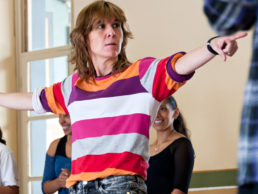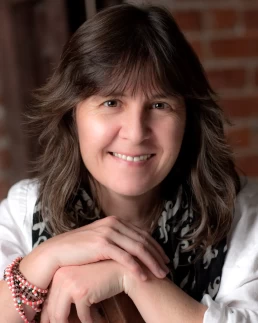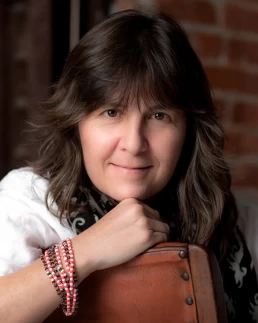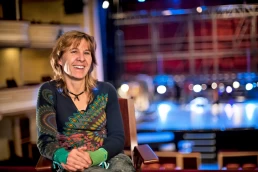BIOGRAFÍA
Chía Patiño
Directora Escénica • Compositora • Directora Artística
Biografía
Después de diez años como Directora Artística y Ejecutiva del Teatro Nacional Sucre en Quito (2009-2019), Chía Patiño, directora escénica y compositora, ha regresado a Estados Unidos, donde la encontraremos al momento como directora escénica y profesora en la reconocida Universidad de Michigan en Ann Arbor.
En su versátil carrera la encontraremos como directora escénica de diversas óperas entre las que destacan como proyectos mas recientes La Hija del Regimiento para Opera Colorado, La Traviata para Florida Gran Opera, Suite Española 1 y 2 para Houston Grand Opera, Orpheus & Eurydice para Seattle Operay Florencia en el Amazonas en España para Opera Tenerife. En su compromise con nuevas obras la encontraremos dirigiendo Ñomongetá de Diego Sánchez Haase en NY y Washington (la única ópera en guaraní) así como el taller de Paradiso, con música de Yevgeny Sharlat y libretto de Stephanie Fleischmann. El próximo Verano dirigirá la premiere mundial de La casa en Mango Street con música de Derek Bermell y libretto de Sandra Cisneros en el Festival de Glimmerglass así como El Giro De La Tuerca de Benjamin Britten.
En Ecuador dirigió , Dido & Aeneas, Carmen, Manuela y Bolivar, Luisa Fernanda, Faust y La Flauta Mágica de los Andres así como los musicales Spring Awakening, West Side Story y Sweeney Todd. Como directora musical dirigió la Ópera Mariachi Cruzar la Cara de la Luna con funciones en Houston, Paris, Chicago, Forth Worth, Phoenix, San Diego, Tucson, El Paso y Quito. Como compositora su trabajo más reciente fue la música para Guadual, el primer circo ecuatoriano, obra presentada con éxito en Latinoamérica y Barcelona así como un ciclo de canciones para el joven tenor guayaquileño César Parreño.
Declaración Artística
Creo en la música como creo en el arte. Creo que la verdadera esencia de nuestra humanidad se refleja a través de ese invisible e intocable producto. Nos muestra nuestra dualidad en sus extremos: lo mejor y peor de nosotros. Porque la humanidad tiene muchos lados, y deberíamos, sino sentirlos, por lo menos ver tantos lados como podamos. Encontraremos que la música, como el arte, nos hace reír y llorar; en su luz ilumina nuestros amigos, familia, nuestro primer amor o desamor, y marca todas las memorias que nos tejen. Su lado oscuro evidencia nuestros temores, nuestras heridas y nos deja percibir y cuestionar lo desconocido.
La música y el arte son sentimientos: no pueden ser cortados o borrados. Atraviesa fronteras como la censura, por lo cual — aunque en la historia encontremos muchos artistas que fueron silenciados — todo lo que debía ser dicho vive y habla en su arte.
He visto miles de espectáculos en la última década. En ellos, he visto a la audiencia perdida pacíficamente en sus sentimientos. Y sentir es un lujo en el tiempo actual, en el que la publicidad, las luces, el marketing y gran parte de la sociedad nos manipula para que entendamos y compremos lo que necesitamos para ser felices. En el santuario de un teatro (y de las artes) — cuando las luces se apagan — no seremos juzgados ni empujados: recordamos…sentimos: son espacios que nos permiten ser frágiles y recordar nuestra esencia.
Como directora escénica intento decir cosas que considero importantes; para mi es necesario entender y estar consiente de nuestro tiempo y de nuestra audiencia. Luisa Fernanda es una historia de amor, pero al final, Luisa elige el amante equivocado – y ésto le hemos hecho muchos. Fausto, no reconoce que lo seduce el poder y la idea de recuperar la juventud, ni que quien lo seduce, es el demonio. En Los Miserables era importante ubicarnos en el tiempo actual, donde son siempre los estudiantes a quienes encontramos en la primera fila de la lucha contra el poder y sus abusos. Venezuela nos demuestra ésto: es importante entender y recordar que podemos y debemos resistir. Y descubriendo la cosmovisión indígena durante La Flauta Mágica de los Andes, aprendí sorprendida que, en los valores ancestrales, la humanidad podrá percibir lo bueno en valores simples como la valentía, la fortaleza y la justicia. Vi un teatro lleno de indígenas que escuchaban a taita Mozart y reían; vi niños que, al desconocer los artificios de “como portarse en la ópera” hablaban con Papageno en el escenario, como si fuera un espectáculo de títeres infantil- y lo era. Creo que a Mozart le hubiera encantado esto. Hubo magia en nuestra Flauta. El arte nos purifica y reaccionamos de una manera natural. Creo en la ópera que no busca a la élite, que en su forma original buscaba siempre entretenernos, pero además a veces, tenía la urgencia de hablarnos de cosas importantes, de pinchar nuestra consiencia. Pero e aquí su magia: el artista buscará decir una cosa, pero la audiencia sentirá lo que necesite sentir. Creo en esa magia.
Por diez años ese fue mi enfoque: regalar al público esos momentos mágicos. Pero mientras más trabajaba en eso, más entendía que lo importante es cuidar las raíces: los creadores. Son los estudiantes y los aprendices quienes generarán el nuevo arte. Un arte que debe ser actual, y no una copia de la historia. Y, aún sintiendo orgullo por las producciones que he dirigido, creo que es el momento de pasar lo que he aprendido. Enseñar a los jóvenes artistas a percibir nuestro tiempo y encontrar una verdadera razón para hablar por la que no compren nuestra voz. Comunicar y respetar nuestra audiencia y su tiempo. Al dirigir, mi espacio favorito ha sido siempre los ensayos: donde los artistas se comunican con honestidad y buscan remar en una dirección sabiendo sólo hacia donde queda la meta. Preparar a jóvenes directores y cantantes me entusiasma.
La vida me ha dado grandes oportunidades y vivencias. Aunque aún tengo mucho que decir, creo que es urgente preparar a las futuras voces, pues enfrentan tiempos muy complicados: un tiempo donde el sistema insiste en enseñar al público a no sentir…
Quito, Julio 6 del 2019
Biography
Chía Patiño
Stage Director • Composer • Cultural Manager • Artistic Director
Biography
After ten years as Artistic and Executive Director of the Teatro Nacional Sucre in Quito, Ecuador (2009-2019), stage director and composer Chía Patiño has returned to the United States, where we will now find her as a stage director and professor at the renowned University of Michigan in Ann Arbor.
In her versatile career we will find her as a stage director of various operas, among which the most recent projects stand out: The Daughter of the Regiment for Opera Colorado, La Traviata for Florida Grand Opera, Suite Española 1 and 2 for Houston Grand Opera, Orpheus & Eurydice for Seattle Opera and Florencia en el Amazonas in Spain for Opera Tenerife. In her commitment to new works we will find her directing Ñomongetá by Diego Sánchez Haase in NY and Washington (the only opera in Guaraní) as well as the workshop of Paradiso, with music by Yevgeny Sharlat and libretto by Stephanie Fleischmann. Next summer she will direct the world premiere of The House on Mango Street with music by Derek Bermell and libretto by Sandra Cisneros at the Glimmerglass Festival as well as The Turn of the Screw by Benjamin Britten.
In Ecuador she conducted Dido & Aeneas, Carmen, Manuela and Bolivar, Luisa Fernanda, Faust and The Magic Flute of the Andres as well as the musicals Spring Awakening, West Side Story and Sweeney Todd. As musical director she directed the Opera Mariachi Cruzar la Cara de la Luna with performances in Houston, Paris, Chicago, Forth Worth, Phoenix, San Diego, Tucson, El Paso and Quito. As a composer her most recent work was the music for Guadual, the first Ecuadorian circus, a work presented with success in Latin America and Barcelona as well as a song cycle for the young tenor from Guayaquil César Parreño.
Artistic Statement
I believe in music and I believe in art. I believe the true essence of humanity communicates through that invisible, untouchable product. It shows us at our best and at our worst, because humanity has many sides. Nobody and nothing can control our feelings: through art we perceive as big a scope of things as we allow ourselves. The good, the bad, the allowed and the forbidden: and that makes art dangerous.
At its best we will find music, poetry or paintings that make us laugh or cry, that reminds us of friends and family, our first love, heartbreak or loosing a loved one; trough art most of the memories that build us are engraved forever. At its worst it makes us conscious or remind us of the things that we are afraid of.
Music and art is a feeling: it can not be erased or cut. It passes frontiers such as censorship. Though many artists and their work have been forbidden trough history- what they wanted to say survived trough their art.
I believe in the intimacy of spaces to allow people to be fragile again: I have directed three different spaces in Quito, the capital of Ecuador, and I have witnessed over five thousand spectacles over the last ten years. I saw the audience engrossed in feeling, and feeling is a luxury in our time: publicity and marketing do their best to manipulate us and our feelings get in their way. In the intimacy of a theatre, when the lights go off, and we feel safe and nobody judges or pushes, we will reconnect with our essence.
As a Stage Director, I need to be clear to communicate what I want to say: honesty is imperative. My Luisa Fernanda was a love story were the main character chooses the wrong lover – and many of us can relate to that. Faust is unable to perceive that he is dealing with the devil, and thus gets seduce by power and the idea of being young again. My Les Miserables was updated to current times were we still find students in the frontline of the revolution against corrupted power. Venezuela is a painful reminder at present time of this, and it is important to remember and know that we can resist.
La Flauta Magica de los Andes (The Maglic Flute) seen trough the Andean cosmovision. It showed me pure simple and ancient values: as strength, valour and justice. Their importance cuts trough any timeline. In our production the children that “did not know how to behave in opera”: they talk to Papageno on stage as if it was a puppet show- which it was: we used over one hundred puppets. I think Mozart would have loved it. Magic happened in our Flute. Art makes us pure and we react in a natural way, like children.
I belive in opera that is not for the elite, but the original form: sometimes it is just wants to entertain and sometimes it needs to denounce. But it should always have something to say and share. And here is the magic: the artists will aim to say one thing, but the audience will perceive what they need to perceive.
For ten years I created those moments for the audience. I feel proud of what I have directed. But I think it is now time to focus on the root of art and its creators: the students and apprentices. They will generate the new product. It needs to have a valid voice and be aware of our time. I am looking forward to pass on what I’ve learnt, to teach young stage directors and singers to be aware of their time and surroundings. To conceive art with a reason other then money. To yearn to communicate and respect their audience and times. As a Stage Director, my favorite part has always been the rehearsals: everyone rowing in the same direction not always knowing the goat. Magic. Prepearing the next generation is exciting.
Though I know I still have much to say, I believe it is extremely important to prepare the future voices, as they will be facing very complicated times: a time were the system is numbing everyone. Keeping strong and honest voices is urgent.
Quito, JuIy 6, 2019




